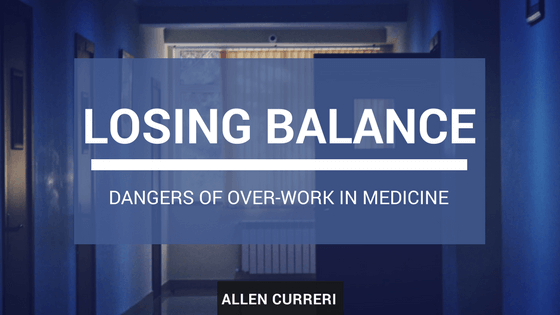Six in the morning, and it’s dark outside. Step through the revolving door, change into scrubs – just another shift. Make the rounds, talk with the nurses. One patient stopped taking their meds; you postpone breakfast to explain why they need to start again. Consultations, check-in, paperwork; you skip lunch to fit in another appointment. Stray thought: hospital food is better than vending machine snacks, but not by much. The day blurs in a cycle of files, hallways, and endless trips to identical patient rooms. You deliver bad news to patients who seem too used to it and good news to parents who seem more shell-shocked than joyful. Consultations, check-in, paperwork; you sit on the floor of the break room with the file of a patient you lost and wonder what you missed. Just one more patient, one more file; shift’s over, but you’re still storming the floor. Eventually, your supervisor takes you to the side and points you towards home.
Step through the revolving door, drive home, fall into bed. Stare at the ceiling until you close your eyes; blink them open hours later. Six in the morning, and it’s dark outside. You get up and prepare to do it all again.
I’ve written about the dangers of physician burnout and the risks of over-work before. Today, though, I want to address the dangers of one of the condition’s cofactors: work addiction. Most of us have had late days at work or felt as though we needed to stay late to finish a project. With workaholism, however, that urge becomes a powerful compulsion to work at the expense of a doctor’s personal life and health. These over-workers aren’t motivated by external factors such as financial need, but driven by an intense internal urge to work beyond reasonable limits. The seeds of this drive often start early and with good intentions: A medical student might reassure themselves that they can handle an already-overloaded portfolio of clinical and academic work, or a junior doctor might try to push through just one more hour of an already too-long shift and see just one more patient before they crash. However, this push for high achievement is often destructive for both the doctor and those in their orbit. In 2009, a study published in Work & Stress found that “[work-addicted doctors] create difficulties for their co-workers, and they refuse to delegate work. Moreover, they are characterized by orderliness, rigidity and a high need for achievement, and by inflexibility and perfectionism.” The same study noted that work addiction prompted a negative feedback loop for the junior doctors participating in the study. As the doctors devoted more of their limited time and energy resources to work, their personal lives atrophied – thus leaving them with less social support and reason to leave their work. Ironically, these physicians only harmed their performance by sacrificing their personal lives for the sake of their jobs because they simply don’t leave themselves the time or space to recoup their mental and physical wellness after a stressful day.
The implications of these findings are troubling both from a human and professional standpoint. As empathetic people, we should be worried about our doctors: no career should be to the detriment of a person’s mental health and the erosion of their personal lives. Because they push themselves beyond their limits, these physicians take less joy in their work and feel as though they have fewer resources and are less healthy than their colleagues. This trend towards compulsive over-work should also be troubling to health institutions; after all, an institution with unhealthy, exhausted doctors will perform at a lower level than those with engaged and well-rested physicians.
Some work has already been done to rectify this issue. In spring of 2017, the Accreditation Council for Graduate Medical Education (ACGME) revised its guidelines for residents. By these new rules, medical residents are limited to working 80 hours a week. While this may still seem shocking for those who work comparatively ordinary 50 or 60-hour work weeks, this limit is a great step forward towards limiting doctors from working over a hundred hours a week. This all said, the same guidelines extend shift limits from 16 hours to 24. This latter change is troubling, given the impact poor sleep can have on job performance. But this is exactly my point: We need to be prepared to help overworked, stressed, and disengaged doctors – not take half-measures. Capping working hours is a start, but young doctors still face the risk over over-work and low performance due to exhaustion. If we intend to make a real change, we need to take the time to critically assess doctor caseloads and have structures in place to support doctors through emotionally charged cases before they burn out. We can help doctors come back from work-driven collapse; but wouldn’t it be better if they never were in a position to fall in the first place?


